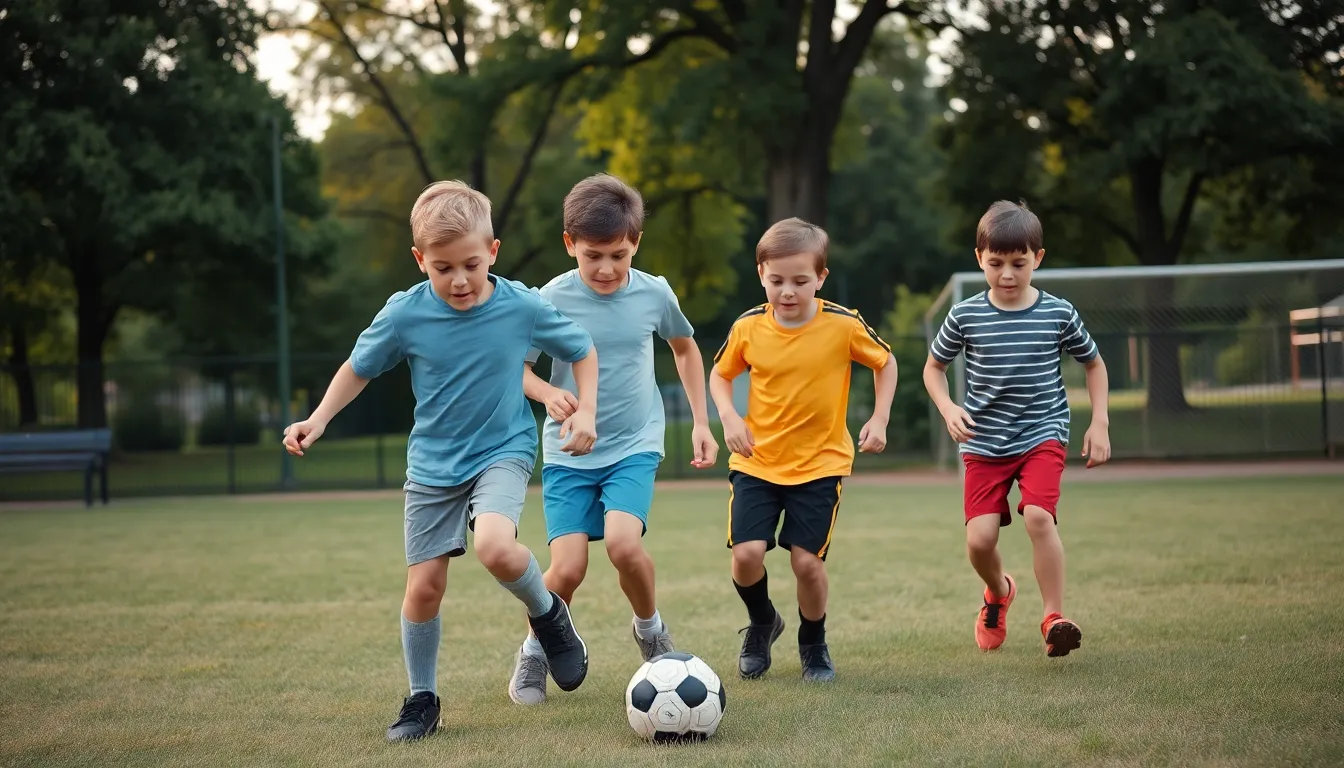Puberty is that magical time when boys transform from carefree kids into awkward, hormone-fueled teenagers. But when does this wild ride actually kick off? For most boys, puberty usually begins between ages 9 and 14, but it can feel like a game of dodgeball—some get hit early while others take their sweet time.
Table of Contents
ToggleUnderstanding Puberty
Puberty involves a series of physical and emotional changes that prepare boys for adulthood. This developmental phase usually starts between ages 9 and 14, but individual experiences may differ significantly. Some boys begin showing signs earlier, while others take longer to start the process.
Hormonal changes kick off this transition. The body increases production of testosterone, leading to growth spurts, voice changes, and increased muscle mass. Additionally, boys may notice the development of facial and body hair during this period.
Psychological aspects also emerge during puberty. Emotional fluctuations often occur, influenced by hormonal shifts. Boys may experience heightened interests in social interactions, friendships, and romantic relationships as they navigate adolescence.
Health professionals emphasize the importance of open conversations about puberty. Providing resources, such as books or workshops, can help boys understand the changes they experience. Encouraging discussions with trusted adults or peers serves as a beneficial approach to addressing concerns and queries.
Understanding puberty equips boys with knowledge. With the right information, they navigate this transitional stage more effectively. Staying informed about these changes fosters confidence and ensures a smoother progression into adolescence.
When Does Puberty Typically Start?

Puberty typically starts between the ages of 9 and 14. It varies significantly among individual boys.
Average Age Range
Most boys experience the onset of puberty around 11 years old. About 20% may begin earlier, around age 9. Physical changes usually kick off first, then emotional developments follow. Growth spurts often occur at this time, leading to increased height and muscle mass. By age 14, many boys have gone through most of the major changes associated with puberty.
Factors Influencing Start Age
Several factors influence when puberty begins. Genetics plays a crucial role; family history can indicate average onset age. Nutrition also affects development; boys with a healthy diet tend to start puberty later. Lifestyle factors, including physical activity levels, may impact hormonal timing too. Environmental influences such as exposure to certain chemicals can also trigger earlier changes. Lastly, overall health conditions like chronic illness can delay the onset of puberty.
Physical Changes During Puberty
Puberty triggers significant physical changes in boys, marking a crucial stage in their development. These transformations prepare them for adulthood and contribute to their emotional and social growth.
Growth Spurts
Growth spurts usually occur during puberty, often around ages 11 to 13. Many boys may experience a rapid increase in height, averaging about 3 to 4 inches per year. This accelerated growth can result in temporary clumsiness as their bodies adjust. Muscles also begin to develop more noticeably during this time, leading to increased strength and agility. Not all boys grow at the same pace; some might begin their growth spurts earlier or later, with genetics playing a significant role in determining the timing.
Development of Secondary Sexual Characteristics
The development of secondary sexual characteristics becomes prominent during puberty. Changes often include the growth of facial and body hair, starting around age 12. Voice deepening frequently occurs, which can create noticeable fluctuations in pitch. Additionally, boys may see widening of shoulders and an increase in muscle mass as testosterone levels rise. These changes contribute to the transition from boyhood to early adulthood, shaping their identities in social and physical contexts.
Emotional and Psychological Effects
Puberty brings significant emotional and psychological changes for boys. They often experience new feelings and thoughts that may seem overwhelming at first.
Mood Swings and Changes in Behavior
Mood swings frequently occur during puberty. Increased hormone levels, particularly testosterone, can lead to rapid shifts in emotions. Boys might feel happy one moment and frustrated or anxious the next. Behavioral changes may manifest as irritability or heightened sensitivity. These fluctuations are typical during this developmental stage as boys adjust to their evolving identities. Understanding this phenomenon helps boys, and those around them navigate these challenges better.
Social Implications
Social interactions change dramatically during puberty. New interests in friendships and romantic connections emerge, causing boys to seek acceptance and validation. Peer relationships often play a crucial role during this time as boys may become more influenced by their friends. Social anxiety might arise from concerns about appearance or fitting in. Developing communication skills can foster healthy relationships and enhance self-esteem. Emphasizing mutual support among peers is essential for navigating this tumultuous period.
Puberty marks a significant transition in a boy’s life. Understanding its onset and the changes that accompany it helps boys navigate this complex period with greater confidence. By recognizing the variability in timing and the range of physical and emotional developments, boys can better prepare for the journey ahead. Open discussions with trusted adults and peers can provide essential support as they face new challenges and experiences. Embracing this transformative time fosters resilience and promotes healthy growth into adulthood.



